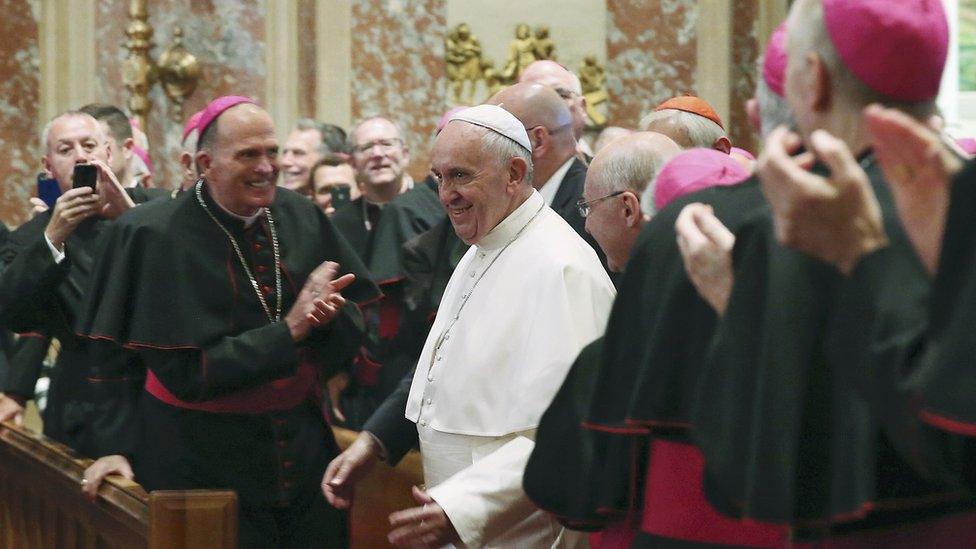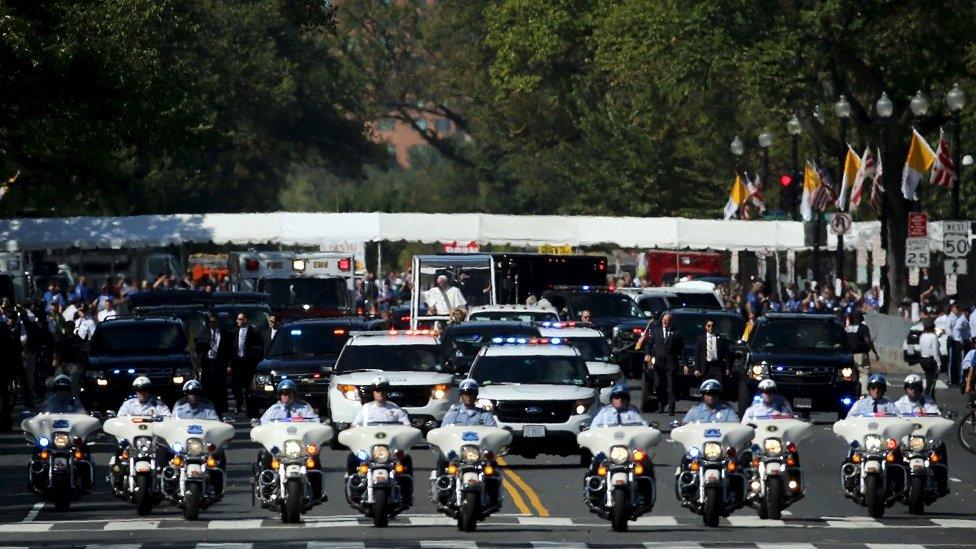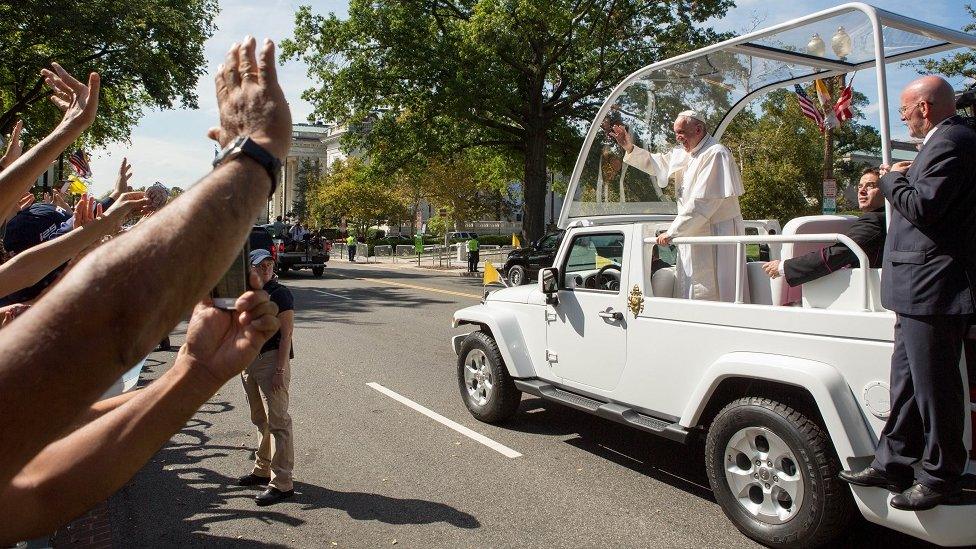Pope Francis urges action on climate change on visit to US
- Published
Pope Francis said climate change was a problem that could "no longer be left to a future generation"
Pope Francis has called for further action on climate change saying that it was "a critical moment of history", on the first day of his visit to the US.
Speaking to a crowd of more than 11,000 people on the White House South Lawn, the pontiff said the problem could "no longer be left to a future generation".
President Barack Obama said the Pope reminded people "that we have a sacred obligation to protect our planet".
The Pope also praised the response of US bishops to the sex abuse crisis.
He told those gathered at St Matthew's Cathedral that the US church leaders had brought a "generous commitment to bring healing to victims", but said the church officials must work to ensure the abuse will not happen again.
Earlier, making a rare speech in English to thousands at the White House, Pope Francis praised President Obama for recent proposals aimed at tackling air pollution.
Time remains to make the changes required, the Pope said, in a speech that also called for protecting religious liberty and stamping out discrimination.



At the White House - Barbara Plett Usher, BBC News
President Obama couldn't have hoped for a clearer endorsement of his climate agenda from such an immense source of moral authority.
Pope Francis made a strong pitch for battling climate change, including specific reference to Mr Obama's clean air initiative. His position tracks so closely to the president's it has some conservatives grumbling.
But they should have been pleased by his robust defence of religious freedoms - interpreted by US bishops as the right to follow their convictions in the face of court rulings on same sex marriage and the contraceptive mandate in Mr Obama's health care law.
The pope has pushed back against criticism that he's "a bit lefty" and indeed, he doesn't fit neatly into American political divisions.
He says he's just preaching Catholic social doctrine, but clearly with his own emphasis and style - in an everyday act of resistance to the pomp and circumstance of high office he drove up to the White House in a humble Fiat.

The environmental issue is a divisive one in US politics, with one Republican congressman boycotting the Pope's speech to Congress on Thursday because of the pontiff's stance.
All the leading Republican presidential candidates oppose action to tackle climate change because they say it will hurt the economy.
The morning began with the pontiff emerging from the Apostolic Nunciature - the Holy See's equivalent of an embassy - around 0900 local time (1400 BST).
Clad in his traditional white cassock, Pope Francis spent several minutes greeting well-wishers who had assembled behind temporary fencing in front of the diplomatic complex.
After shaking hands and giving hugs and kisses to the largely young crowd, the pope boarded a modest hatchback trailed by a convoy of large security vehicles and made the 15-minute drive through Washington on streets that had been cleared of traffic for the occasion.
A look at the key moments during Wednesday's visit between President Barack Obama and Pope Francis

The Pope has been protected by a massive security apparatus during the visit
President Obama paid tribute to the ''humility'' of Pope Francis in his welcome address
At the White House large crowds gathered on the South Lawn to greet the pontiff. Officials said over 11,000 tickets had been issued, but noted that the crowd was even larger.
A cadre of Obama administration officials and a military colour guard flanked a stage set up outside the South Portico - among the most rare and respectful diplomatic ceremonies that the US government can offer visiting dignitaries.
Following a military colour guard and the playing of the Holy See and US national anthems, President Obama welcomed the pope with brief remarks.
After the Pope spoke, he held a private meeting with the president at the White House Oval Office before the Pope embarked on a parade in a specially outfitted jeep known as the "Popemobile".
Crowds lined the streets, and a young girl and a baby were allowed to cross security barriers to be greeted and hugged.
Later on Wednesday, the Pope will conduct the first canonisation on US soil, at the Basilica of the National Shrine of the Immaculate Conception, in Washington.
What do gay Catholics want from the Pope?

At the afternoon Mass, Junipero Serra, a Spanish Franciscan who founded a mission in California in the 18th Century, will become the first Hispanic saint in the US.
But the decision to canonise the missionary has been criticised by some Native Americans, who view him as someone who aggressively imposed Catholicism on their ancestors.
Pope Francis has in the past apologised for the treatment of indigenous people.